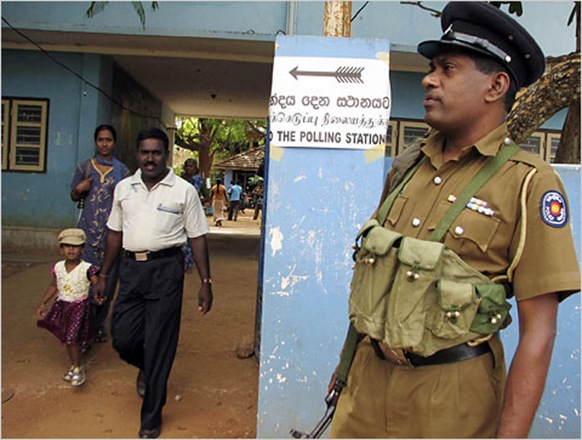 In the first local elections in 11 years in two towns in northern Sri Lanka, a political party that supported the Tamil Tiger insurgency made a strong showing on Saturday, one day after the rebel group’s new leader was captured.
In the first local elections in 11 years in two towns in northern Sri Lanka, a political party that supported the Tamil Tiger insurgency made a strong showing on Saturday, one day after the rebel group’s new leader was captured.
According to the BBC, voter turnout was just 20 percent in the town of Jaffna, and 52 percent in Vavuniya, both of which were controlled by the Liberation Tigers of Tamil Eelam (L.T.T.E.) for years and are now underpopulated, since the government has not yet given more than 250,000 ethnic Tamils permission to leave internment camps and return home.
Despite such a large number of missing Tamil voters, the Tamil National Alliance, which supported the rebels that the government defeated three months ago, won the most seats in Vavuniya’s local government and the second most in Jaffna. The government coalition, which included Tamil politicians, did win control of Jaffna, but finished third in Vavuniya, behind another Tamil party.
In this video report, the BBC’s Charles Haviland observed that the government coalition had been expected to win in both towns. Mr. Haviland added that it is difficult to say exactly why the vote went the way it did, since independent journalists were barred from the region by the government. The Christian Science Monitor’s Mian Ridge suggested that the reason was simple:
Though the Tamil Tigers terrorized the mostly Tamil inhabitants of the north, their ostensible goal — a Tamil homeland — is supported by many Tamils who have suffered decades of discrimination by the Sinhalese majority. Most observers agree that some measure of Tamil autonomy is now necessary for stability in Sri Lanka.
Last week, Reuters noted that Sri Lanka’s president, Mahinda Rajapaksa, “has promised to let civilians who lived in the northern areas the L.T.T.E. ran as a defacto state vote in a future province-wide election, part of his plan to devolve power to the Tamil-majority area.” But, in an interview with my colleague Lydia Polgreen last month, Mr. Rajapaksa said only a limited amount of devolution was on offer:
“Federalism is out of the question,” he said. “It must be a homegrown solution.”
Most Tamil political leaders want a single, Tamil-speaking majority state in the north and east of the country that would have authority over most matters except foreign policy, trade and the military.
But this is a nonstarter for many of the Sinhala Buddhist nationalist politicians who make up the core of Mr. Rajapaksa’s coalition government. The most hard-line nationalist party has threatened to leave the coalition if even a watered-down law to share power is passed.
The local elections took place three months after the government defeated the Tamil Tigers and killed their leader, Velupillai Prabhakaran. On Friday, Sri Lanka announced that it had captured the rebel group’s new leader, Selvarasa Pathmanathan, in another Asian country. Some reports said that Mr. Pathmanathan, also known by his nom de guerre K.P., had been seized in Thailand, but a Tamil Tiger spokesman said that the arrest had been made “near a hotel” in Malaysia.
(For updates you can share with your friends, follow TNN on Facebook and Twitter )
